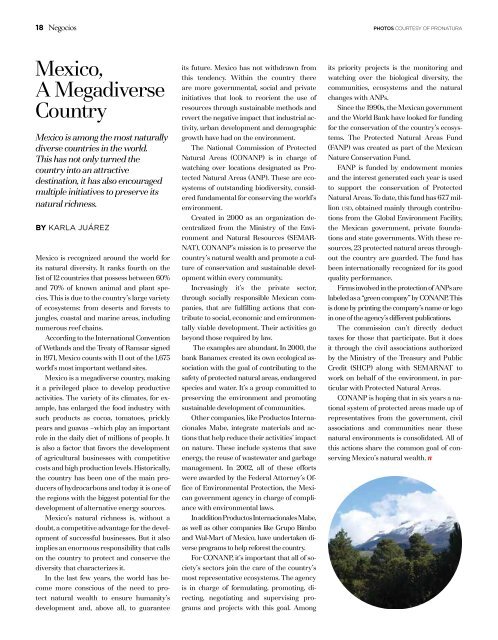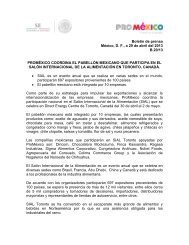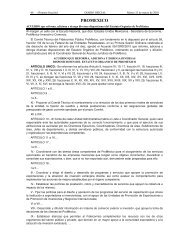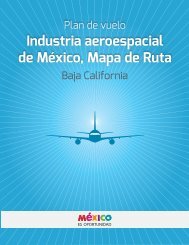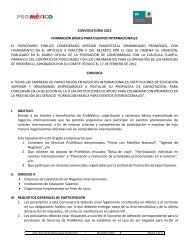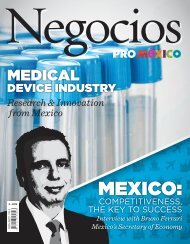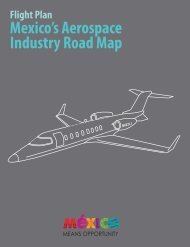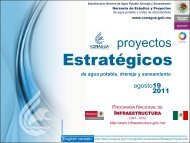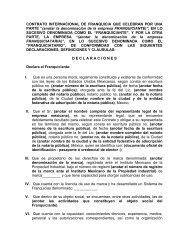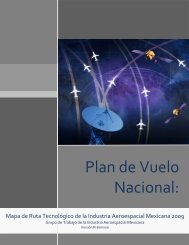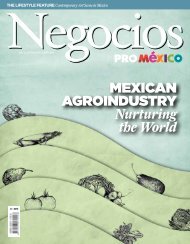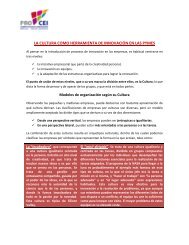GREEN ROOF EFFECT - ProMéxico
GREEN ROOF EFFECT - ProMéxico
GREEN ROOF EFFECT - ProMéxico
Create successful ePaper yourself
Turn your PDF publications into a flip-book with our unique Google optimized e-Paper software.
18 Negocios Photos Courtesy of pronatura<br />
Mexico,<br />
A Megadiverse<br />
Country<br />
Mexico is among the most naturally<br />
diverse countries in the world.<br />
This has not only turned the<br />
country into an attractive<br />
destination, it has also encouraged<br />
multiple initiatives to preserve its<br />
natural richness.<br />
By Karla Juárez<br />
Mexico is recognized around the world for<br />
its natural diversity. It ranks fourth on the<br />
list of 12 countries that possess between 60%<br />
and 70% of known animal and plant species.<br />
This is due to the country’s large variety<br />
of ecosystems: from deserts and forests to<br />
jungles, coastal and marine areas, including<br />
numerous reef chains.<br />
According to the International Convention<br />
of Wetlands and the Treaty of Ramsar signed<br />
in 1971, Mexico counts with 11 out of the 1,675<br />
world’s most important wetland sites.<br />
Mexico is a megadiverse country, making<br />
it a privileged place to develop productive<br />
activities. The variety of its climates, for example,<br />
has enlarged the food industry with<br />
such products as cocoa, tomatoes, prickly<br />
pears and guavas –which play an important<br />
role in the daily diet of millions of people. It<br />
is also a factor that favors the development<br />
of agricultural businesses with competitive<br />
costs and high production levels. Historically,<br />
the country has been one of the main producers<br />
of hydrocarbons and today it is one of<br />
the regions with the biggest potential for the<br />
development of alternative energy sources.<br />
Mexico’s natural richness is, without a<br />
doubt, a competitive advantage for the development<br />
of successful businesses. But it also<br />
implies an enormous responsibility that calls<br />
on the country to protect and conserve the<br />
diversity that characterizes it.<br />
In the last few years, the world has become<br />
more conscious of the need to protect<br />
natural wealth to ensure humanity’s<br />
development and, above all, to guarantee<br />
its future. Mexico has not withdrawn from<br />
this tendency. Within the country there<br />
are more governmental, social and private<br />
initiatives that look to reorient the use of<br />
resources through sustainable methods and<br />
revert the negative impact that industrial activity,<br />
urban development and demographic<br />
growth have had on the environment.<br />
The National Commission of Protected<br />
Natural Areas (CONANP) is in charge of<br />
watching over locations designated as Protected<br />
Natural Areas (ANP). These are ecosystems<br />
of outstanding biodiversity, considered<br />
fundamental for conserving the world’s<br />
environment.<br />
Created in 2000 as an organization decentralized<br />
from the Ministry of the Environment<br />
and Natural Resources (SEMAR-<br />
NAT), CONANP’s mission is to preserve the<br />
country’s natural wealth and promote a culture<br />
of conservation and sustainable development<br />
within every community.<br />
Increasingly it’s the private sector,<br />
through socially responsible Mexican companies,<br />
that are fulfilling actions that contribute<br />
to social, economic and environmentally<br />
viable development. Their activities go<br />
beyond those required by law.<br />
The examples are abundant. In 2000, the<br />
bank Banamex created its own ecological association<br />
with the goal of contributing to the<br />
safety of protected natural areas, endangered<br />
species and water. It’s a group committed to<br />
preserving the environment and promoting<br />
sustainable development of communities.<br />
Other companies, like Productos Internacionales<br />
Mabe, integrate materials and actions<br />
that help reduce their activities’ impact<br />
on nature. These include systems that save<br />
energy, the reuse of wastewater and garbage<br />
management. In 2002, all of these efforts<br />
were awarded by the Federal Attorney’s Office<br />
of Environmental Protection, the Mexican<br />
government agency in charge of compliance<br />
with environmental laws.<br />
In addition Productos Internacionales Mabe,<br />
as well as other companies like Grupo Bimbo<br />
and Wal-Mart of Mexico, have undertaken diverse<br />
programs to help reforest the country.<br />
For CONANP, it’s important that all of society’s<br />
sectors join the care of the country’s<br />
most representative ecosystems. The agency<br />
is in charge of formulating, promoting, directing,<br />
negotiating and supervising programs<br />
and projects with this goal. Among<br />
its priority projects is the monitoring and<br />
watching over the biological diversity, the<br />
communities, ecosystems and the natural<br />
changes with ANPs.<br />
Since the 1990s, the Mexican government<br />
and the World Bank have looked for funding<br />
for the conservation of the country’s ecosystems.<br />
The Protected Natural Areas Fund<br />
(FANP) was created as part of the Mexican<br />
Nature Conservation Fund.<br />
FANP is funded by endowment monies<br />
and the interest generated each year is used<br />
to support the conservation of Protected<br />
Natural Areas. To date, this fund has 67.7 million<br />
usd, obtained mainly through contributions<br />
from the Global Environment Facility,<br />
the Mexican government, private foundations<br />
and state governments. With these resources,<br />
23 protected natural areas throughout<br />
the country are guarded. The fund has<br />
been internationally recognized for its good<br />
quality performance.<br />
Firms involved in the protection of ANPs are<br />
labeled as a “green company” by CONANP. This<br />
is done by printing the company’s name or logo<br />
in one of the agency’s different publications.<br />
The commission can’t directly deduct<br />
taxes for those that participate. But it does<br />
it through the civil associations authorized<br />
by the Ministry of the Treasury and Public<br />
Credit (SHCP) along with SEMARNAT to<br />
work on behalf of the environment, in particular<br />
with Protected Natural Areas.<br />
CONANP is hoping that in six years a national<br />
system of protected areas made up of<br />
representatives from the government, civil<br />
associations and communities near these<br />
natural environments is consolidated. All of<br />
this actions share the common goal of conserving<br />
Mexico’s natural wealth. n


